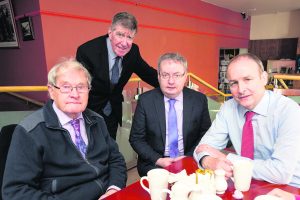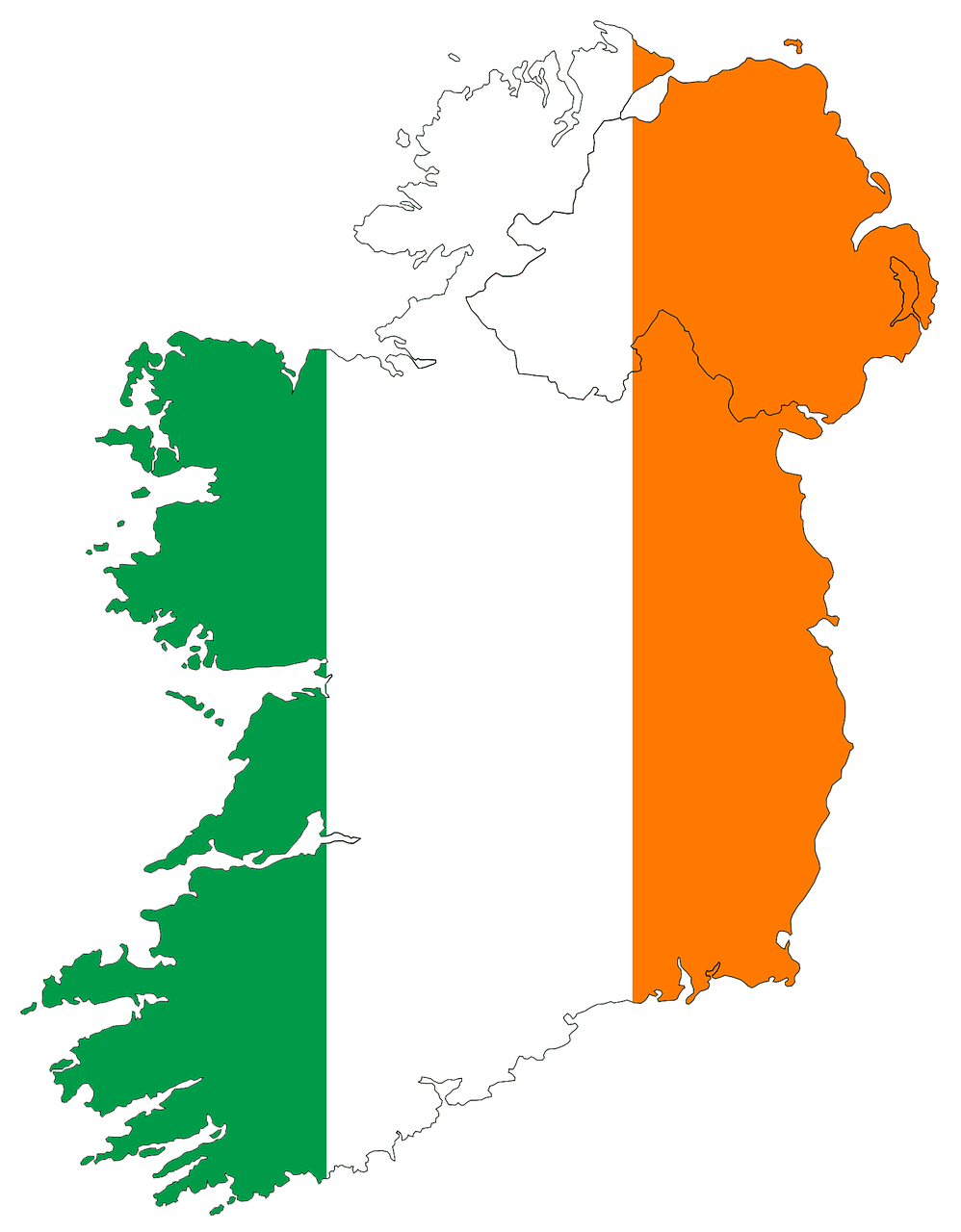
Lá Féile Bríd dawned a lovely crisp, dry day, the first day of Spring. Shortly after eleven in the morning, I found myself sitting across a table from Micheál Martin and some of his colleagues, drinking coffee. It’s not often we get an opportunity to talk to political leaders, so I was glad of the chance to try to get a sense of the man. Accompanying Micheál were Councillor Ian Doyle, party whip Michael Moynihan, and Munster Regional organiser Colm Leahy. Four suited and booted gentlemen, I felt in no way daunted in my jeans and tee-shirt. As an opener to the conversation I asked how the campaign trail was going, and if he was preparing for a General Election. “Not necessarily” he said. Micheál was quick to point out that he wasn’t exactly on a campaign trail, but that he makes it his business to stay engaged with his constituents and has done since he was elected leader of the party. But he jokingly mentioned an old motto in the Scouts: “Bí ullamh”! He told me that he’s been meeting people in all the towns, villages and rural areas because it keeps him grounded, and informed of people’s concerns. “Leinster House can be a bubble: it can be a media and political bubble,” he stated. He went on to express his disappointment in the latest developments, or lack of, on the issue of rural broadband. He said that big businesses in rural areas are still operating, to their credit, despite not having effective broadband technologies in place. “What’s your solution?” I asked. He simply replied that he believes there’s a case for state intervention. He said that the country has waited long enough for the expansion of effective broadband, and that it’s a vital part of the economy. People could effectively work from their own homes. The Multinational Technology company Apple, for instance, he said, could potentially employ hundreds of extra staff if Broadband was available to them in their homes. Michael Moynihan, who has taken a special interest in the issue for quite some time, stated that all systems are in place for rural fibreoptic Broadband, but so far, no real measures have been taken to secure the technology country-wide.
I asked the Fianna Fáil party leader what issues he was meeting on the doorsteps he visited. He spoke of people’s very real concerns at reports of hospital waiting lists, unused hospital beds. But lack of recruitment is responsible for empty hospital beds. Children’s therapies are also something he’s passionate about. He believes that the systems in place for assessment are needlessly complicated and aren’t doing it in terms of provisional therapies. He has spoken to the government about putting simpler measures in place through primary schools. Having children’s essential therapists in situ to deal with speech and language difficulties is a way of counteracting the long assessment method, and ensures a child gets the help it needs much faster. In rural areas, a cluster of schools could easily employ essential therapists needed for children with disabilities, or difficulties, particularly with speech and language. It’s a game changer, he says, to get a child the help that’s needed at the earliest of stages. The pay restoration for employees of bodies like Milford Hospice, Enable Ireland and more is vital. These bodies have a major dependency on public donations, and he believes that it’s unfair to place the burden of funding on the public. Regarding small hospitals nationwide, he said that the need to utilise these facilities more is vital, particularly in primary care, diagnostics and in terms of intervention. “We need to move fast on this issue” he said. “Our population is living longer” Community Primary Care centres, with multidisciplinary teams are a vital part of freeing up hospital beds as is providing extra home help hours for the elderly in an effort to keep more people living in their own homes.”
He spoke of the recent Christmas ‘flu season and the fact that right through the crisis, beds in some hospitals were left idle, because funding for extra nurses wasn’t provided. It’s his understanding that one nurse and two care assistants would service ten beds. It would take considerable pressure off the A and E department of major hospitals, he added. There is now a programme for investment in smaller hospitals but mostly in the context of respite and residential care. Martin would add a third arm, he says, to allow the hospitals to function as they were intended originally.
I asked if he envisioned a return to economic viability for rural Ireland. He stated that he’s worried about the new National Framework for Ireland. He said that “the new planning framework will kill rural Ireland”. Planning laws need to be examined. “There has to be room in every framework for what I call organic growth, human innovation and industry,” He spoke of the benefits of rural communities, and asked if we were about to become anonymous towns, and cities? Again, he said that rolling out countrywide Broadband is essential and could transform rural Ireland. The key piece of infrastructure for the area he said was the M20. It would open up many rural areas in Munster. Planning for the road was halted some years back, and Martin feels that it should have been “kept ticking over” until funding was eventually found for it. He fears that now there may be a flurry of National plans announced, but they will be meaningless unless timelines are allocated. He intends to address the shortcomings of the National Framework in Leinster House.
I then asked Micheál Martin why he’d changed his mind about supporting the repeal of the eight amendment to the constitution. He told me that he thinks that every voter should have a voice in the issue, and that ultimately, people will have their own personal feelings on the matter and will vote accordingly. He also has his own personal beliefs, he said. But two years ago, he’d met with a group of mothers of babies with fatal foetal abnormalities. Their stories were harrowing, he said. Circumstances prevented these mothers from having babies that they desperately wanted. He himself is no stranger to the many medical professionals in the country. He believes that they will always want to save lives, it’s simply what they do. “At the moment in Ireland, we have unregulated and unrestricted access to abortion via the abortion pill,” he said. He doesn’t believe that we will have a cultural change. He again stated that his belief is that the medical profession will try to deliver babies safely to mothers, and that has always been the case. And ultimately, it will be the voters who decide.
“Micheál, do you have a Super hero?” I asked. “There’s been a number of heroes in my life” he answered. “My father was my first and foremost. His whole philosophy of life is something I’ve adhered to”. Paddy Martin’s life story is one of resilience, having lost his parents at a young age. Micheál’s love of GAA is a result of his father’s influence. “Fairness and justice for all would have been his hallmark,” he said of his father. Politically, the late Jack Lynch is also someone he admired greatly. He spoke of his first political rally in Cork in 1977 when he was a fifth-year student. His father had taken him to see the crowds gathered in Patrick Street after Lynch led Fianna Fáil in a landslide victory. As a youngster, he was impressed by the atmosphere, and by Jack Lynch’s rendition of “The Banks” at the end.
“My overall vision for the country, in the first instance, would be that every child has access to the best of education” He went on to say that he wants to see therapies for special needs children on the ground, within communities. “Where those children have ready access to health services, and have a roof over their heads”
I’d been given an allocation of about fifteen minutes of this man’s time. It’s to his credit that I got almost an hour. For an ordinary Jane Doe like me who’d long ago given up on the democratic ideal that I was raised with, my meeting with Micheál did much to question if my cynicism of the political arena was justified. The jury is still out on that. But I didn’t doubt his sincerity. Had I managed to get a sense of the man? At times, his Cork accent was very discernible, and I realised that it came to the fore when he spoke with passion, particularly when referring to children’s needs and when speaking about his father. He has real concerns for children and the elderly, I suspect, in part due to personal experience. He is very much a politician, and a statesman. He is a very well-spoken, educated man who, like all politicians, has a clear vision for the future. It remains to be seen if his vision ever comes to pass.





